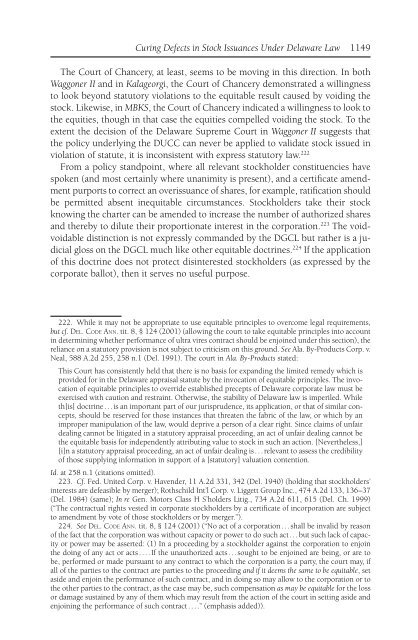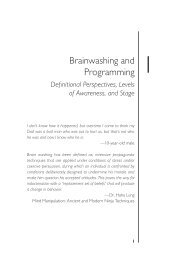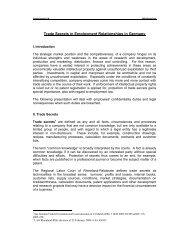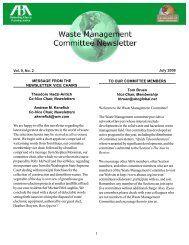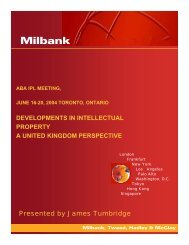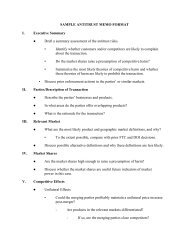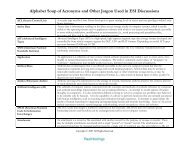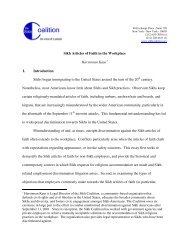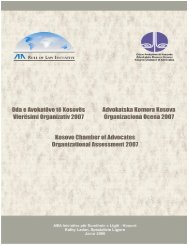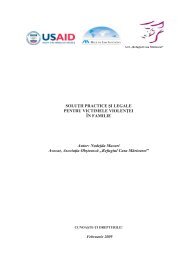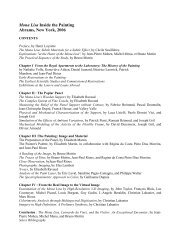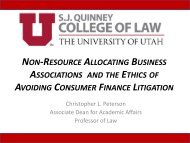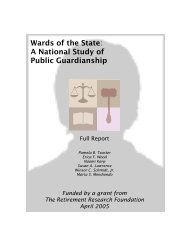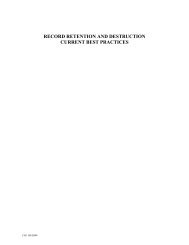Curing Defects in Stock Issuances - American Bar Association
Curing Defects in Stock Issuances - American Bar Association
Curing Defects in Stock Issuances - American Bar Association
Create successful ePaper yourself
Turn your PDF publications into a flip-book with our unique Google optimized e-Paper software.
<strong>Cur<strong>in</strong>g</strong> <strong>Defects</strong> <strong>in</strong> <strong>Stock</strong> <strong>Issuances</strong> Under Delaware Law 1149<br />
The Court of Chancery, at least, seems to be mov<strong>in</strong>g <strong>in</strong> this direction. In both<br />
Waggoner II and <strong>in</strong> Kalageorgi, the Court of Chancery demonstrated a will<strong>in</strong>gness<br />
to look beyond statutory violations to the equitable result caused by void<strong>in</strong>g the<br />
stock. Likewise, <strong>in</strong> MBKS, the Court of Chancery <strong>in</strong>dicated a will<strong>in</strong>gness to look to<br />
the equities, though <strong>in</strong> that case the equities compelled void<strong>in</strong>g the stock. To the<br />
extent the decision of the Delaware Supreme Court <strong>in</strong> Waggoner II suggests that<br />
the policy underly<strong>in</strong>g the DUCC can never be applied to validate stock issued <strong>in</strong><br />
violation of statute, it is <strong>in</strong>consistent with express statutory law. 222<br />
From a policy standpo<strong>in</strong>t, where all relevant stockholder constituencies have<br />
spoken (and most certa<strong>in</strong>ly where unanimity is present), and a certifi cate amendment<br />
purports to correct an overissuance of shares, for example, ratifi cation should<br />
be permitted absent <strong>in</strong>equitable circumstances. <strong>Stock</strong>holders take their stock<br />
know<strong>in</strong>g the charter can be amended to <strong>in</strong>crease the number of authorized shares<br />
and thereby to dilute their proportionate <strong>in</strong>terest <strong>in</strong> the corporation. 223 The voidvoidable<br />
dist<strong>in</strong>ction is not expressly commanded by the DGCL but rather is a judicial<br />
gloss on the DGCL much like other equitable doctr<strong>in</strong>es. 224 If the application<br />
of this doctr<strong>in</strong>e does not protect dis<strong>in</strong>terested stockholders (as expressed by the<br />
corporate ballot), then it serves no useful purpose.<br />
222. While it may not be appropriate to use equitable pr<strong>in</strong>ciples to overcome legal requirements,<br />
but cf. DEL. CODE ANN. tit. 8, § 124 (2001) (allow<strong>in</strong>g the court to take equitable pr<strong>in</strong>ciples <strong>in</strong>to account<br />
<strong>in</strong> determ<strong>in</strong><strong>in</strong>g whether performance of ultra vires contract should be enjo<strong>in</strong>ed under this section), the<br />
reliance on a statutory provision is not subject to criticism on this ground. See Ala. By-Products Corp. v.<br />
Neal, 588 A.2d 255, 258 n.1 (Del. 1991). The court <strong>in</strong> Ala. By-Products stated:<br />
This Court has consistently held that there is no basis for expand<strong>in</strong>g the limited remedy which is<br />
provided for <strong>in</strong> the Delaware appraisal statute by the <strong>in</strong>vocation of equitable pr<strong>in</strong>ciples. The <strong>in</strong>vocation<br />
of equitable pr<strong>in</strong>ciples to override established precepts of Delaware corporate law must be<br />
exercised with caution and restra<strong>in</strong>t. Otherwise, the stability of Delaware law is imperiled. While<br />
th[is] doctr<strong>in</strong>e . . . is an important part of our jurisprudence, its application, or that of similar concepts,<br />
should be reserved for those <strong>in</strong>stances that threaten the fabric of the law, or which by an<br />
improper manipulation of the law, would deprive a person of a clear right. S<strong>in</strong>ce claims of unfair<br />
deal<strong>in</strong>g cannot be litigated <strong>in</strong> a statutory appraisal proceed<strong>in</strong>g, an act of unfair deal<strong>in</strong>g cannot be<br />
the equitable basis for <strong>in</strong>dependently attribut<strong>in</strong>g value to stock <strong>in</strong> such an action. [Nevertheless,]<br />
[i]n a statutory appraisal proceed<strong>in</strong>g, an act of unfair deal<strong>in</strong>g is . . . relevant to assess the credibility<br />
of those supply<strong>in</strong>g <strong>in</strong>formation <strong>in</strong> support of a [statutory] valuation contention.<br />
Id. at 258 n.1 (citations omitted).<br />
223. Cf. Fed. United Corp. v. Havender, 11 A.2d 331, 342 (Del. 1940) (hold<strong>in</strong>g that stockholders’<br />
<strong>in</strong>terests are defeasible by merger); Rothschild Int’l Corp. v. Liggett Group Inc., 474 A.2d 133, 136 –37<br />
(Del. 1984) (same); In re Gen. Motors Class H S’holders Litig., 734 A.2d 611, 615 (Del. Ch. 1999)<br />
(“The contractual rights vested <strong>in</strong> corporate stockholders by a certifi cate of <strong>in</strong>corporation are subject<br />
to amendment by vote of those stockholders or by merger.”).<br />
224. See DEL. CODE ANN. tit. 8, § 124 (2001) (“No act of a corporation . . . shall be <strong>in</strong>valid by reason<br />
of the fact that the corporation was without capacity or power to do such act . . . but such lack of capacity<br />
or power may be asserted: (1) In a proceed<strong>in</strong>g by a stockholder aga<strong>in</strong>st the corporation to enjo<strong>in</strong><br />
the do<strong>in</strong>g of any act or acts . . . . If the unauthorized acts . . . sought to be enjo<strong>in</strong>ed are be<strong>in</strong>g, or are to<br />
be, performed or made pursuant to any contract to which the corporation is a party, the court may, if<br />
all of the parties to the contract are parties to the proceed<strong>in</strong>g and if it deems the same to be equitable, set<br />
aside and enjo<strong>in</strong> the performance of such contract, and <strong>in</strong> do<strong>in</strong>g so may allow to the corporation or to<br />
the other parties to the contract, as the case may be, such compensation as may be equitable for the loss<br />
or damage susta<strong>in</strong>ed by any of them which may result from the action of the court <strong>in</strong> sett<strong>in</strong>g aside and<br />
enjo<strong>in</strong><strong>in</strong>g the performance of such contract . . . .” (emphasis added)).


